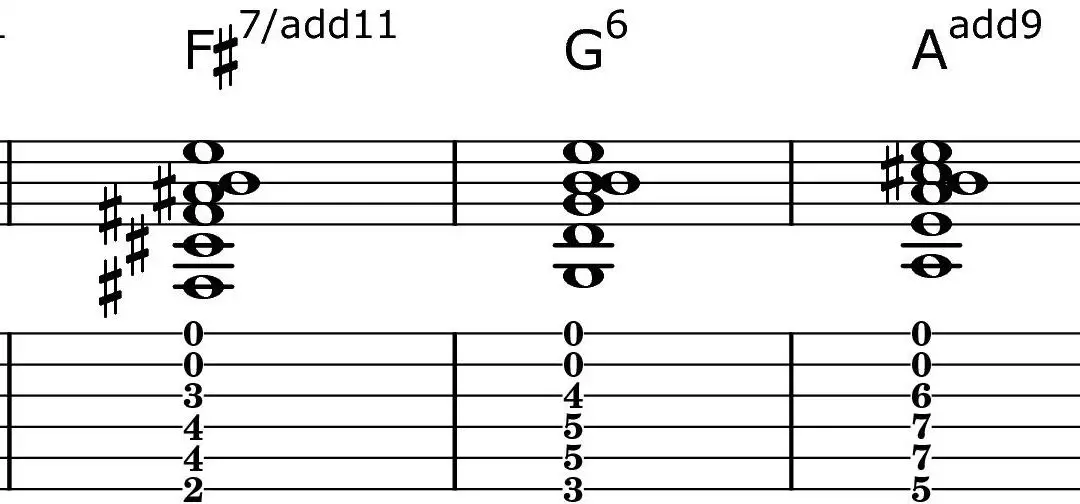Music has the power to transport us to different worlds, evoke intense emotions, and make us tap our feet uncontrollably. And what better way to unlock that magic than by exploring the diverse and delightful world of guitar chords across various musical genres? From the soulful R&B vibes of John Mayer to the hard-hitting rock riffs of Led Zeppelin, strap in as we take a whirlwind tour through the wide and wild landscape of chords that will have you shredding like a pro in no time (or at least pretending to)!
Contents
- 1 Unraveling the Diversity of Guitar Chords in Different Musical Traditions
- 2 The Harmonic Backbone: Common Chords in Rock and Blues
- 3 A Study of Intricacy: Chords in Jazz Guitar
- 4 The Resonant Soul of Folk: Simple Yet Profound Chords
- 5 Classical Guitar: Where Technique Meets Harmony
- 6 Bridging Worlds: Fusion Genres and Innovative Chord Usage
- 7 Beyond the Basics: Extended Chords and Modulations in Progressive Music
- 8 FAQs
- 9 Rock on with Your Chords!
Unraveling the Diversity of Guitar Chords in Different Musical Traditions
Let’s take a journey through the mesmerizing world of guitar chords in various musical traditions. Brace yourselves, because things might get a little… diverse!
First off, we’ll delve into the mystical realms of Flamenco music. *strums guitar dramatically* Flamenco guitar chords are like a secret code, each one unlocking a different emotion. From the dramatic flair of the E7 chord to the haunting beauty of the A minor, Flamenco chords will transport you to a whole new world of musical expression.
Next on our list is good ol’ Country music. Yeehaw! Country guitar chords are like a recipe for a good time. Slap on a cowboy hat, grab your acoustic guitar, and strum away to those sweet sounds of G, C, D, and E minor chords. It’s like a hoedown in chord form!
And let’s not forget about the enchanting world of Indian Classical music. *sits cross-legged on the floor* Indian guitar chords are like a journey through time and space. With intricate fingerings and exotic names like Raag Yaman Kalyan, these chords will open up a whole new dimension of musical exploration. So grab your sitar (or guitar) and get ready to be mesmerized!

The Harmonic Backbone: Common Chords in Rock and Blues
So, you’re ready to rock out like a pro, huh? Well, let me tell you about the secret sauce that holds together the world of rock and blues: common chords! These bad boys are the backbone of every great song in these genres, so pay attention!
First up, we’ve got the classic 12-bar blues progression. You can’t call yourself a rock or blues enthusiast without mastering this bad boy. It’s the bread and butter of countless hits, so get cozy with those I-IV-V chords and start jamming your heart out.
Next on the list, we’ve got the power chords. These babies are the key to cranking up the volume and getting that raw, gritty sound that defines rock music. Forget about complex jazz chords – power chords are where it’s at!
And let’s not forget about the blues shuffle. This rhythmic pattern is like the secret handshake of the blues world. If you can nail that swinging groove, you’ll be well on your way to becoming a bona fide rock star.

A Study of Intricacy: Chords in Jazz Guitar
When delving into the world of jazz guitar, one can’t help but be mesmerized by the sheer intricacy of the chords used in this genre. With their complex voicings and colorful tones, jazz chords are like a puzzle waiting to be solved by the daring guitarist.
Picture yourself sitting in a dimly lit jazz club, surrounded by the smooth sounds of a guitarist effortlessly navigating through a maze of chords. Each chord progression is like a musical rollercoaster, taking you on a journey through highs and lows, twists and turns.
As you listen closely, you begin to notice the subtle nuances that make jazz chords so unique. The use of extensions, alterations, and substitutions adds layers of complexity to each chord, creating a rich tapestry of sound that is both challenging and rewarding for the player.
So the next time you pick up your guitar, why not venture into the world of jazz chords? Embrace the intricacy, challenge yourself to unlock the mysteries of these complex voicings, and who knows? You might just discover a whole new side of your playing that you never knew existed.

The Resonant Soul of Folk: Simple Yet Profound Chords
Folk music has a way of tapping into the deepest recesses of our souls with its simple yet profound chords. It’s like the musical equivalent of a warm hug from a long-lost friend – comforting, familiar, and oh-so soothing. The resonant soul of folk music can transport us to a simpler time, where life was less hectic and more in tune with the rhythms of nature.
With its heartfelt lyrics and soul-stirring melodies, folk music has a way of making us feel connected to something greater than ourselves. Whether we’re tapping our feet to a lively fiddle tune or shedding a tear to a haunting ballad, there’s something about folk music that speaks to our very core. It’s like the musical equivalent of chicken soup for the soul – nourishing, satisfying, and oh-so comforting.
So next time you’re feeling overwhelmed by the chaos of modern life, why not take a break and lose yourself in the timeless beauty of folk music? Let those simple yet profound chords wash over you like a gentle wave, transporting you to a place of peace and tranquility. After all, as the old folk saying goes, “A good melody can soothe even the weariest soul.”

Classical Guitar: Where Technique Meets Harmony
Have you ever tried playing the classical guitar and ended up feeling like your fingers were doing a chaotic dance instead of producing sweet melodies? Well, fear not! In the world of classical guitar, technique and harmony are like two peas in a pod – you can’t have one without the other.
When it comes to technique, it’s all about finesse and precision. From placing your fingers on the fretboard just right to executing those tricky arpeggios flawlessly, mastering technique is key to making your guitar sing like a seasoned pro. So, don’t be afraid to spend hours perfecting that fingerpicking pattern or practicing those difficult chord progressions – your efforts will pay off in spades.
On the other hand, harmony is where the magic happens. It’s like the glue that holds all the beautiful notes together, creating a symphony of sound that can transport you to another world. Whether you’re playing a hauntingly beautiful classical piece or strumming your own composition, harmony is what gives your music that extra oomph that makes heads turn and hearts sing.
So, the next time you pick up your classical guitar, remember that technique and harmony go hand in hand. Embrace the challenge, hone your skills, and let your music soar to new heights. Who knows, you might just be the next classical guitar virtuoso in the making!
Bridging Worlds: Fusion Genres and Innovative Chord Usage
Have you ever been listening to a song and thought to yourself, “Wow, this is like country, rock, and EDM had a musical baby”? If so, you may have stumbled upon a fusion genre. These innovative and often experimental blends of different musical styles create a whole new world of sound for listeners to explore.
One key element of these fusion genres is the use of unconventional chord progressions. Instead of sticking to the same old tired chords, musicians in these genres often mix it up to create unexpected and exciting harmonies. Forget your standard I-IV-V progression – in fusion genres, anything goes. From augmented chords to modal interchange, the possibilities are endless.
Imagine a song that seamlessly transitions from a gritty, distorted guitar riff to a pulsing electronic beat, all while incorporating jazzy chromatic chord changes. It may sound like a musical Frankenstein’s monster, but in the world of fusion genres, it’s pure magic. These genre-bending artists are constantly pushing the boundaries of what’s musically possible, creating a sonic landscape that defies traditional classification.
So next time you’re in the mood for something a little different, why not give a fusion genre a try? Who knows, you might just discover your new favorite musical combination. Whether it’s metalcore-meets-synthpop or reggae-infused hip hop, the world of fusion genres is full of surprises. Embrace the weirdness, embrace the innovation, and let your ears experience a whole new level of musical creativity.
Beyond the Basics: Extended Chords and Modulations in Progressive Music
So you’ve mastered your basic major and minor chords, but are you ready to take your music to the next level? Let’s dive into the world of extended chords and modulations in progressive music!
Extended chords are like the cool, edgy cousin of your typical triads. They add a whole new layer of complexity and richness to your music. Experiment with chords like the dominant seventh, major seventh, and even the elusive diminished seventh. Trust us, your ears will thank you!
But why stop there? Modulations are like the ultimate power move in progressive music. Take your listeners on a musical journey by shifting keys mid-song. It’s like a rollercoaster ride for your ears! Play around with different modes and tonalities to keep your audience on their toes.
Remember, music is all about pushing boundaries and exploring new horizons. Embrace the world of extended chords and modulations and watch your music soar to new heights. Who knows, you may just be the next prog rock legend in the making!
FAQs
Question 1: What are some unique guitar chords commonly used in jazz music?
Well, dear reader, in the whimsical world of jazz music, you might encounter chords like the mysterious and jazzy-sounding diminished seventh chord, the enigmatic augmented chord, or the sophisticated ninth chord. These chords add a touch of intrigue and sophistication to your musical palette!
Question 2: How can I incorporate country-style chords into my guitar playing?
Ah, country music, where cowboy hats meet guitar strums! To infuse some countrified charm into your playing, try using chords like the twangy dominant seventh chord, the down-home major sixth chord, or the rootsy sus4 chord. Yee-haw!
Question 3: What are some essential chords for playing rock music?
Rock on, my fellow guitar enthusiast! When rocking out, you’ll want to master chords like the powerful power chord, the rebellious barre chord, and the gritty seventh chord. These chords will have you headbanging in no time!
Question 4: How can I incorporate world music influences into my chord progressions?
Travel the globe through your guitar chords! To infuse some worldly flair into your music, experiment with chords like the exotic sus2 chord, the spicy add9 chord, or the mysterious minor seventh chord. Your ears will thank you for the musical journey!
Question 5: How can I transition between different genres seamlessly in my guitar playing?
Ah, the art of musical fusion! To smoothly transition between genres, practice incorporating common chords across different styles, like the versatile major and minor chords. Experiment with chord substitutions and learn to adapt your playing style to the genre you’re delving into. Soon enough, you’ll be a genre-hopping guitar maestro!
Rock on with Your Chords!
And there you have it, fellow music explorers! We’ve journeyed through the vast landscape of guitar chords across different genres, from the soulful blues to the electrifying rock, and everything in between. So next time you pick up your guitar, remember to strum those chords with gusto and let your inner rockstar shine through. Keep on exploring, keep on learning, and most importantly, keep on rocking out!



